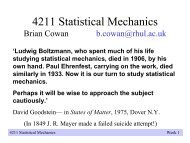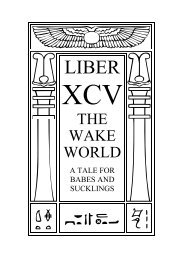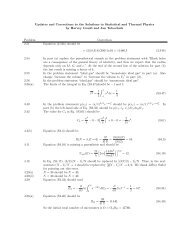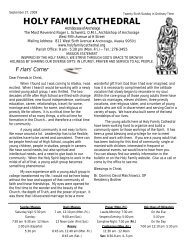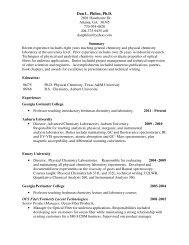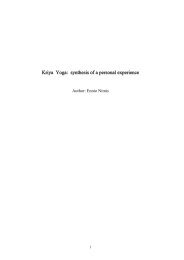A Critique of The German Ideology
A Critique of The German Ideology
A Critique of The German Ideology
You also want an ePaper? Increase the reach of your titles
YUMPU automatically turns print PDFs into web optimized ePapers that Google loves.
personal and the class individual, the accidental nature <strong>of</strong> the conditions <strong>of</strong> life for the<br />
individual, appears only with the emergence <strong>of</strong> the class, which is itself a product <strong>of</strong> the<br />
bourgeoisie. This accidental character is only engendered and developed by competition<br />
and the struggle <strong>of</strong> individuals among themselves. Thus, in imagination, individuals seem<br />
freer under the dominance <strong>of</strong> the bourgeoisie than before, because their conditions <strong>of</strong> life<br />
seem accidental; in reality, <strong>of</strong> course, they are less free, because they are more subjected<br />
to the violence <strong>of</strong> things. <strong>The</strong> difference from the estate comes out particularly in the<br />
antagonism between the bourgeoisie and the proletariat. When the estate <strong>of</strong> the urban<br />
burghers, the corporations, etc. emerged in opposition to the landed nobility, their<br />
condition <strong>of</strong> existence -- movable property and craft labour, which had already existed<br />
latently before their separation from the feudal ties -- appeared as something positive,<br />
which was asserted against feudal landed property, and, therefore, in its own way at first<br />
took on a feudal form. Certainly the refugee serfs treated their previous servitude as<br />
something accidental to their personality. But here they only were doing what every class<br />
that is freeing itself from a fetter does; and they did not free themselves as a class but<br />
separately. Moreover, they did not rise above the system <strong>of</strong> estates, but only formed a<br />
new estate, retaining their previous mode <strong>of</strong> labour even in their new situation, and<br />
developing it further by freeing it from its earlier fetters, which no longer corresponded to<br />
the development already attained. [3]<br />
For the proletarians, on the other hand, the condition <strong>of</strong> their existence, labour, and with<br />
it all the conditions <strong>of</strong> existence governing modern society, have become something<br />
accidental, something over which they, as separate individuals, have no control, and over<br />
which no social organisation can give them control. <strong>The</strong> contradiction between the<br />
individuality <strong>of</strong> each separate proletarian and labour, the condition <strong>of</strong> life forced upon<br />
him, becomes evident to him himself, for he is sacrificed from youth upwards and, within<br />
his own class, has no chance <strong>of</strong> arriving at the conditions which would place him in the<br />
other class.<br />
Thus, while the refugee serfs only wished to be free to develop and assert those<br />
conditions <strong>of</strong> existence which were already there, and hence, in the end, only arrived at<br />
free labour, the proletarians, if they are to assert themselves as individuals, will have to<br />
abolish the very condition <strong>of</strong> their existence hitherto (which has, moreover, been that <strong>of</strong><br />
all society up to the present), namely, labour. Thus they find themselves directly opposed<br />
to the form in which, hitherto, the individuals, <strong>of</strong> which society consists, have given<br />
themselves collective expression, that is, the State. In order, therefore, to assert<br />
themselves as individuals, they must overthrow the State.<br />
It follows from all we have been saying up till now that the communal relationship into<br />
which the individuals <strong>of</strong> a class entered, and which was determined by their common<br />
interests over against a third party, was always a community to which these individuals<br />
belonged only as average individuals, only ins<strong>of</strong>ar as they lived within the conditions <strong>of</strong><br />
existence <strong>of</strong> their class -- a relationship in which they participated not as individuals but



